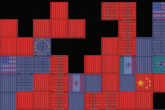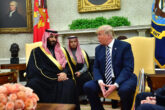December 12, 2020
How US Sanctions Are Pushing Iran, Venezuela, and North Korea Closer Together
Three of the most heavily sanctioned states – Iran, North Korea, and Venezuela – are strengthening their strategic partnerships as U.S. sanctions continue to squeeze their finances. In recent years, this emerging coalition has sought enhanced military, intelligence, economic, and cybercrime collaboration in evading U.S. sanctions. With sophistication and growth, these countries could become more adept at evading sanctions and expanding military capabilities that threaten U.S. national security. Moreover, sanctions-induced humanitarian repercussions incur immense reputational costs for the United States and can bolster anti-American rhetoric, which legitimizes the regimes to their populations. American policymakers should consider how to adapt sanctions implementation to undercut the hostile coalition of sanctioned nations and their growing ability to harm U.S. security interests and threaten the safety of our allies.
American policymakers should consider how to adapt sanctions implementation to undercut the hostile coalition of sanctioned nations.
U.S. policy vis-a-vis Iran has not effectively deterred Iran-North Korean collaboration in weapons development, a trend that is true with and without the Iran nuclear deal, the Joint Comprehensive Plan of Action (JCPOA). The two autocratic states always had shared distrust in American foreign policy, and were pushed closer together once the Trump administration withdrew from the JCPOA and ramped up sanctions. North Korean diplomat Ri Yong Ho remarked during a visit to Iran in 2018 that U.S. policy on Iran makes it “untrustworthy and unreliable,” and that Iran and North Korea had “always had close views” on many issues. This enmity toward the United States at the highest level manifests in almost every aspect of North Korean-Iranian interaction.
Read the full article in The Diplomat.
More from CNAS
-
Game Over?
The trade wargame suggests that sustained high tariffs could create leverage and urgency to spur action toward a productive restructuring of the international trade system....
By Emily Kilcrease & Geoffrey Gertz
-
Middle East Security / Energy, Economics & Security
Trump Inks $600 Bn Deal In Saudi Arabia | Musk, Blackrock CEO Flank Trump In Gulf VisitIn today's episode of India Global, U.S. President Donald Trump secured a $600 billion commitment from Saudi Arabia on Tuesday to invest in the United States. NDTV's Gaurie Dw...
By Daniel Silverberg
-
Energy, Economics & Security / Technology & National Security
Tariffs and Tech: An Uncertain RecipeHigher tariffs could prompt American cloud companies to shift more of their capital investments abroad....
By Pablo Chavez
-
Trump Tariffs: How Will U.S. Plans Reshape the Global Economy?
Donald Trump says he's already decided the tariffs he will impose on countries that export goods to America, including the United Kingdom. Channel 4 hears from Emily Kilcrease...
By Emily Kilcrease




